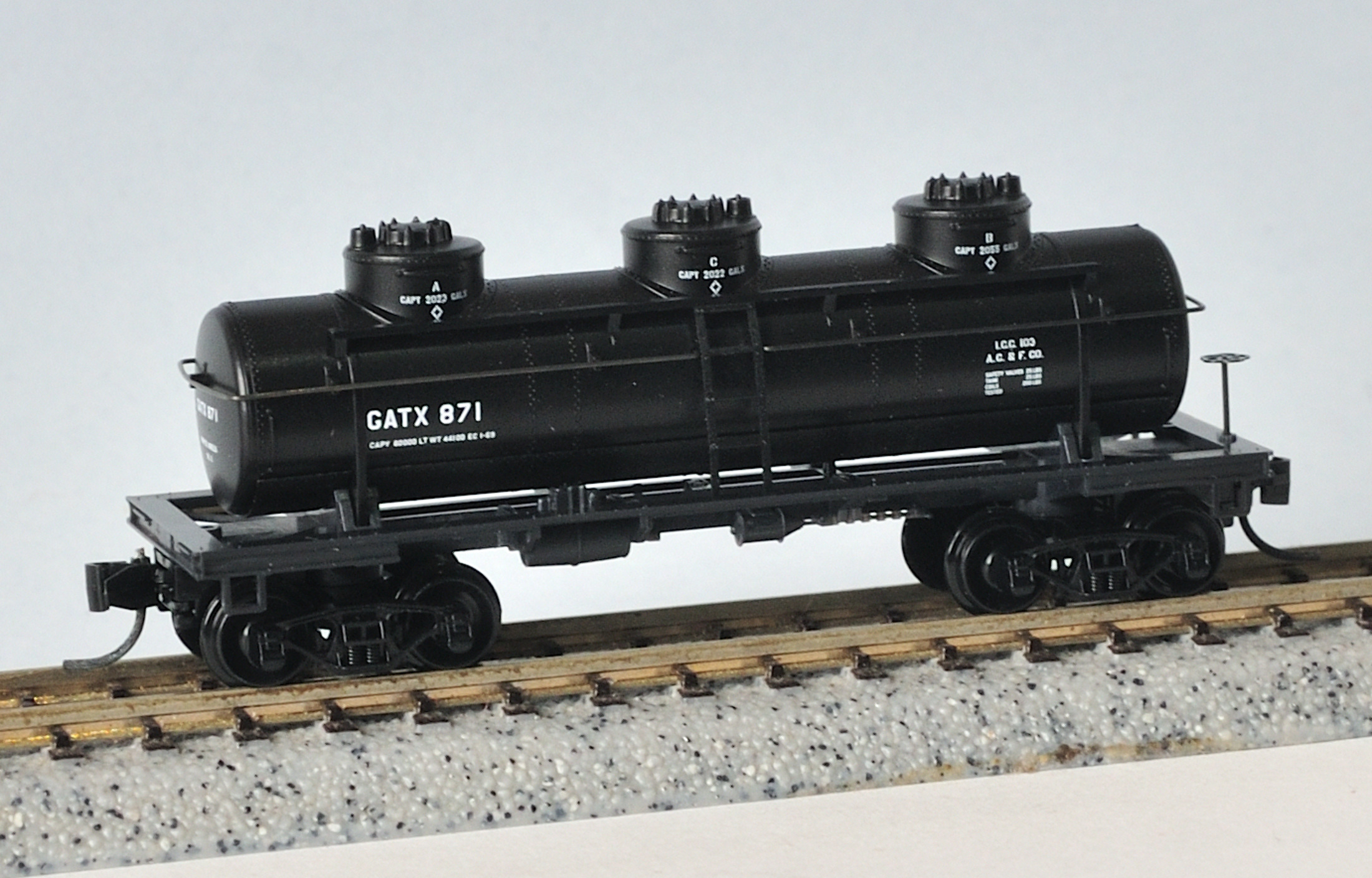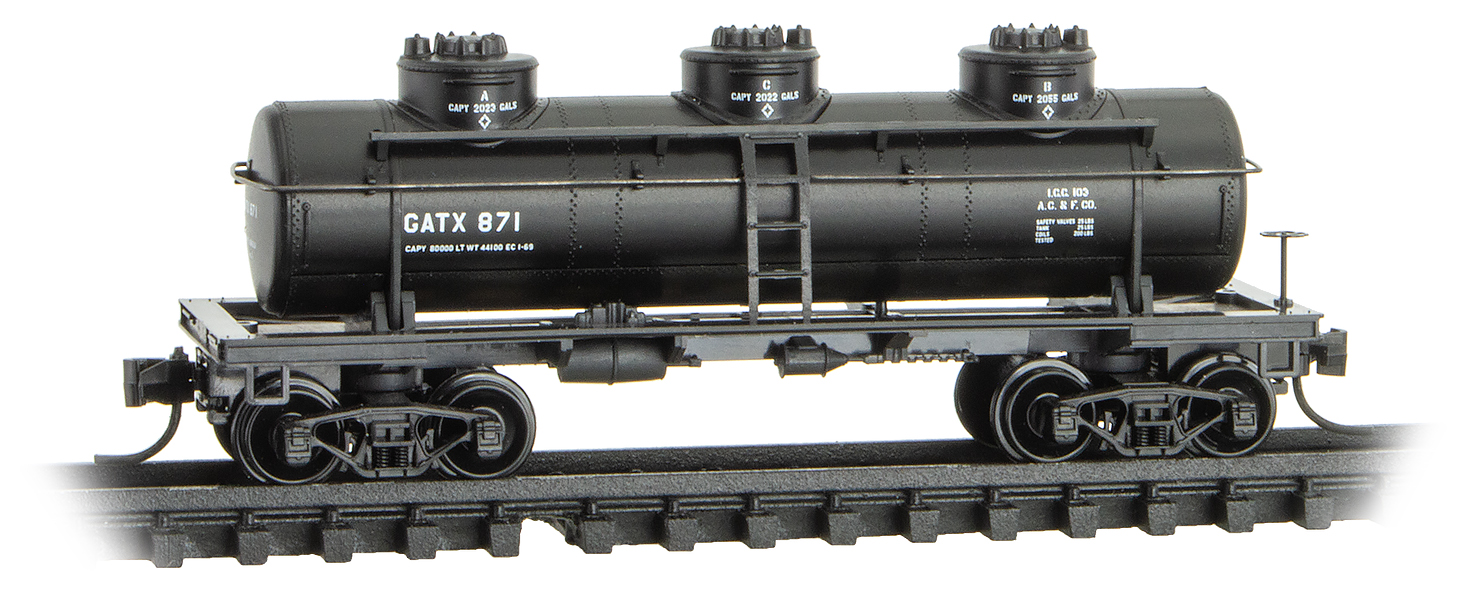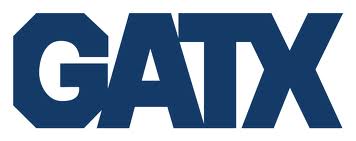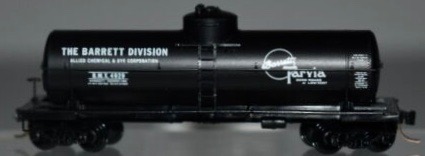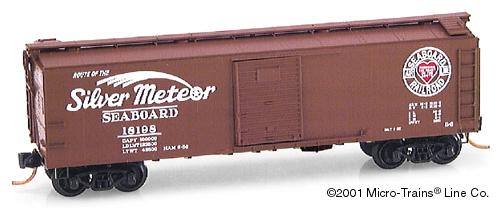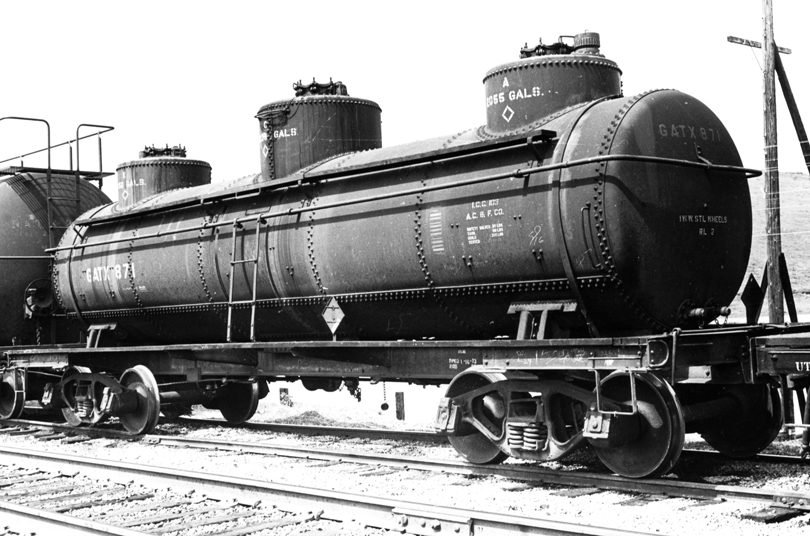Specific Item Information: This three-dome tank car with Bettendorf trucks was designed with three separate compartments for carrying different commodities all in one car. General American Transportation Corporation, now known simply as GATX, is a large railcar leasing company, with over 122,000 railcars in the fleet.
Prototype History: Triple Dome tank cars, while not as common as single-domes, are a railroad staple. They have been around since the first half of the 20th century.
The dome above tank cars serves as an expansion chamber as temperature affects the volume of any liquids contained within. With no dome, if the liquid did not 100% fill the tank, then it is possible for the liquid to slosh around inside the tank, causing instability and increasing the possibility of a derailment. The dome allows the tank to be slightly overfilled so that should the volume in the main section decrease due to colder temperatures or even a small leak, that there will still be sufficient liquid within to prevent sloshing. Similarly if temperature increases, the liquid can rise up inside the dome preventing excess pressure within the tank. While not as serious as an underfilled tank, an over-pressurized tank might present problems during unloading.
If you see three domes on a tank car it is because there are three separate compartments inside the tank car each containing a different liquid. This was desirable for many reasons.
Often times a delivery would consist of much less than a carload (LCL) of liquid. Remember the sloshing problem? So if you only had to fill a third of a tank with your commodity, then you can avoid the issue by using one of the three chambers within the tank car. Also, you might have several grades of a commodity to deliver such as unleaded, leaded and diesel fuel and you need them to be kept separate. Or you might be producing wine and you want your white wine kept separate from your red wine. Or maybe all three chambers had the same contents but were being delivered to three different customers. It can be very difficult to determine when one third of a single dome tank car has been discharged...
For all these reasons, three-dome tank cars were a common sight in the first half of the 20th century. However, with the rise of the interstate highway system and the modern trucking industry, LCL deliveries have primarily been accomplished with tanker trucks instead of tank cars and the three-dome tank car has gradually disappeared from the North American rail network.
The dome above tank cars serves as an expansion chamber as temperature affects the volume of any liquids contained within. With no dome, if the liquid did not 100% fill the tank, then it is possible for the liquid to slosh around inside the tank, causing instability and increasing the possibility of a derailment. The dome allows the tank to be slightly overfilled so that should the volume in the main section decrease due to colder temperatures or even a small leak, that there will still be sufficient liquid within to prevent sloshing. Similarly if temperature increases, the liquid can rise up inside the dome preventing excess pressure within the tank. While not as serious as an underfilled tank, an over-pressurized tank might present problems during unloading.
If you see three domes on a tank car it is because there are three separate compartments inside the tank car each containing a different liquid. This was desirable for many reasons.
Often times a delivery would consist of much less than a carload (LCL) of liquid. Remember the sloshing problem? So if you only had to fill a third of a tank with your commodity, then you can avoid the issue by using one of the three chambers within the tank car. Also, you might have several grades of a commodity to deliver such as unleaded, leaded and diesel fuel and you need them to be kept separate. Or you might be producing wine and you want your white wine kept separate from your red wine. Or maybe all three chambers had the same contents but were being delivered to three different customers. It can be very difficult to determine when one third of a single dome tank car has been discharged...
For all these reasons, three-dome tank cars were a common sight in the first half of the 20th century. However, with the rise of the interstate highway system and the modern trucking industry, LCL deliveries have primarily been accomplished with tanker trucks instead of tank cars and the three-dome tank car has gradually disappeared from the North American rail network.
Road Name History: GATX Corporation (NYSE: GMT) is an equipment finance company based in Chicago, Illinois. Founded in 1898, GATX's primary activities consist of railcar operating leasing in North America and Europe. In addition, GATX leases locomotives in North America, and also has significant investments in industrial equipment. GATX derives its name from its primary reporting mark for its North American railcars, "GATX". The mark itself was derived from GATX's prior corporate name, General American Transportation Corporation. Since all non-railroad owners of railcars must append an "X" to the end of their mark, GAT became GATX. The General American Transportation Corporation became GATX Rail Corporation, a unit of the GATX Corporation, on January 1, 2000.
GATX mainly applies the GATX mark to tank cars, although the mark has been used in other examples such as with hoppers; GATX's primary freight car marks are GACX (for general-service freight cars), GGPX (for coal cars), GIMX (for intermodal cars), GPLX (for plastic pellet cars), GMTX and LLPX (for locomotives), and GPFX (for pressure-differential cars). GATX also owns a number of other marks, including GABX, GAEX, GFSX, GOHX, GSCX, IPSX, and TRIX. Many GATX cars carry a large "GATX" logo in the upper right-hand corner of the car regardless of the reporting mark they carry; this logo is applied for marketing reasons and does not have any operational significance.
GATX engages in both full-service and net leasing of railcars. In a full-service lease, a GATX-owned mark is applied to the car, and GATX maintains the railcar and pays for any required property insurance and property taxes. In a net lease, the lessee applies its mark to the car, and the lessee pays for any required property insurance and property taxes. Often, on a net-leased car, there is no evidence of GATX ownership, although some net lease cars carry a GATX logo.
The most common type of car in the GATX North American fleet is the tank car; other major car types include covered hoppers, open-top hoppers, and gondolas. GATX invests in nearly every type of railcar operated in North America. In Europe, tank cars also make up GATX's largest fleet, but unlike in North America, GATX's European fleet includes substantial quantities of intermodal cars which are owned in a GATX joint venture called AAE Cargo. In contrast, GATX's North American intermodal car fleet is relatively small. This is true of most North American operating lessors; historically the bulk of the industry's intermodal investment has been made by TTX Corporation, which is jointly owned by North America's Class I railroads. X Corporation, which is jointly owned by North America's Class I railroads.
GATX mainly applies the GATX mark to tank cars, although the mark has been used in other examples such as with hoppers; GATX's primary freight car marks are GACX (for general-service freight cars), GGPX (for coal cars), GIMX (for intermodal cars), GPLX (for plastic pellet cars), GMTX and LLPX (for locomotives), and GPFX (for pressure-differential cars). GATX also owns a number of other marks, including GABX, GAEX, GFSX, GOHX, GSCX, IPSX, and TRIX. Many GATX cars carry a large "GATX" logo in the upper right-hand corner of the car regardless of the reporting mark they carry; this logo is applied for marketing reasons and does not have any operational significance.
GATX engages in both full-service and net leasing of railcars. In a full-service lease, a GATX-owned mark is applied to the car, and GATX maintains the railcar and pays for any required property insurance and property taxes. In a net lease, the lessee applies its mark to the car, and the lessee pays for any required property insurance and property taxes. Often, on a net-leased car, there is no evidence of GATX ownership, although some net lease cars carry a GATX logo.
The most common type of car in the GATX North American fleet is the tank car; other major car types include covered hoppers, open-top hoppers, and gondolas. GATX invests in nearly every type of railcar operated in North America. In Europe, tank cars also make up GATX's largest fleet, but unlike in North America, GATX's European fleet includes substantial quantities of intermodal cars which are owned in a GATX joint venture called AAE Cargo. In contrast, GATX's North American intermodal car fleet is relatively small. This is true of most North American operating lessors; historically the bulk of the industry's intermodal investment has been made by TTX Corporation, which is jointly owned by North America's Class I railroads. X Corporation, which is jointly owned by North America's Class I railroads.
Brand/Importer Information: Micro-Trains is the brand name used by both Kadee Quality Products and Micro-Trains Line. For a history of the relationship between the brand and the two companies, please consult our Micro-Trains Collector's Guide.
Manufacturer Information:  Micro-Trains Line split off from Kadee Quality Products in 1990. Kadee Quality Products originally got involved in N-Scale by producing a scaled-down version of their successful HO Magne-Matic knuckle coupler system. This coupler was superior to the ubiquitous 'Rapido' style coupler due to two primary factors: superior realistic appearance and the ability to automatically uncouple when stopped over a magnet embedded in a section of track. The success of these couplers in N-Scale quickly translated to the production of trucks, wheels and in 1972 a release of ready-to-run box cars.
Micro-Trains Line split off from Kadee Quality Products in 1990. Kadee Quality Products originally got involved in N-Scale by producing a scaled-down version of their successful HO Magne-Matic knuckle coupler system. This coupler was superior to the ubiquitous 'Rapido' style coupler due to two primary factors: superior realistic appearance and the ability to automatically uncouple when stopped over a magnet embedded in a section of track. The success of these couplers in N-Scale quickly translated to the production of trucks, wheels and in 1972 a release of ready-to-run box cars.
Micro-Trains Line Co. split off from Kadee in 1990 to form a completely independent company. For this reason, products from this company can appear with labels from both enterprises. Due to the nature of production idiosyncrasies and various random factors, the rolling stock from Micro-Trains can have all sorts of interesting variations in both their packaging as well as the products themselves. When acquiring an MTL product it is very important to understand these important production variations that can greatly enhance (or decrease) the value of your purchase.
Please consult our Micro-Trains Collector's Guide

Micro-Trains Line Co. split off from Kadee in 1990 to form a completely independent company. For this reason, products from this company can appear with labels from both enterprises. Due to the nature of production idiosyncrasies and various random factors, the rolling stock from Micro-Trains can have all sorts of interesting variations in both their packaging as well as the products themselves. When acquiring an MTL product it is very important to understand these important production variations that can greatly enhance (or decrease) the value of your purchase.
Please consult our Micro-Trains Collector's Guide
Item created by: CMK on 2022-09-30 21:59:21. Last edited by gdm on 2022-11-16 11:23:09
If you see errors or missing data in this entry, please feel free to log in and edit it. Anyone with a Gmail account can log in instantly.
If you see errors or missing data in this entry, please feel free to log in and edit it. Anyone with a Gmail account can log in instantly.


